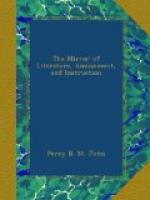releasing corporate bodies in large towns from the
burdensome ceremonies of public receptions; thus making
a compromise between their own dignity and the convenience
of the provincial public. Once introduced, and
the arrangements upon the road for meeting the wants
of travellers once adapted to such a practice, it
would easily become universal. It is, however,
very possible that mere horror of the heats of daytime
may have been the original ground for it. The
ancients appear to have shrunk from no hardship as
so trying and insufferable as that of heat. And
in relation to that subject, it is interesting to
observe the way in which the ordinary use of language
has accommodated itself to that feeling. Our northern
way of expressing effeminacy, is derived chiefly from
the hardships of cold. He that shrinks from the
trials and rough experience of real life in any department,
is described by the contemptuous prefix of
chimney-corner,
as if shrinking from the cold which he would meet on
coming out into the open air amongst his fellow men.
Thus, a
chimney-corner politician for a mere
speculator or unpractical dreamer. But the very
same indolent habit of aerial speculation, which courts
no test of real life and practice, is described by
the ancients under the term
umbraticus, or
seeking the cool shade, and shrinking from the heat.
Thus an
umbraticus doctor is one who has no
practical solidity in his teaching. The fatigue
and hardship of real life, in short, is represented
by the ancients under the uniform image of heat, and
by the moderns under that of cold.
Blackwood’s Magazine.
* * * *
*
RETROSPECTIVE GLEANINGS.
* * * *
*
“PROGRESS” OF CHARLES II. AND HIS
COURT.
The accompanying memorandum relative to Charles II.
and his Court, is copied from an old Family Prayer
Book, and from the date of the book, (?) and appearance
of the writing, there is little doubt of its authenticity.
W.H.
“King Charles the Second, with his Queen Katharine,
the Duke of York, and his Duchess, and Prince Rupert,
the Duke of Monmouth, and many others of the nobility
did lodge in Wickomb, the 30th day of September, in
the yeare 1663. They did come into the town about
4 of the clock the same day. They came from Oxford.
The King in his progress going back again to London.
The King did go out of the town between v and vi of
the clock the next morning, and was at his palace
at Whitehall before 9 of the clock in the morning.
The Queen did go out about viii of the clock, and
dined at Uxbridge, and then went to Whitehall.
The King was lodged with his Queen at the Catharine
Wheel.”
* * * *
*
FAT LIVING.
The vicarage of Wyburn, or Winsburn, Cumberland, is
of the following tempting value: Fifty shilling
per annum, a new surplice, a pair of clogs, and feed
on the common for one goose. This favoured church
preferment is in the midst of a wild country, inhabited
by shepherds. The clerk keeps a pot-house opposite
the church. The service is once a fortnight;
and when there is no congregation, the Vicar and Moses
regale themselves at the bar.




